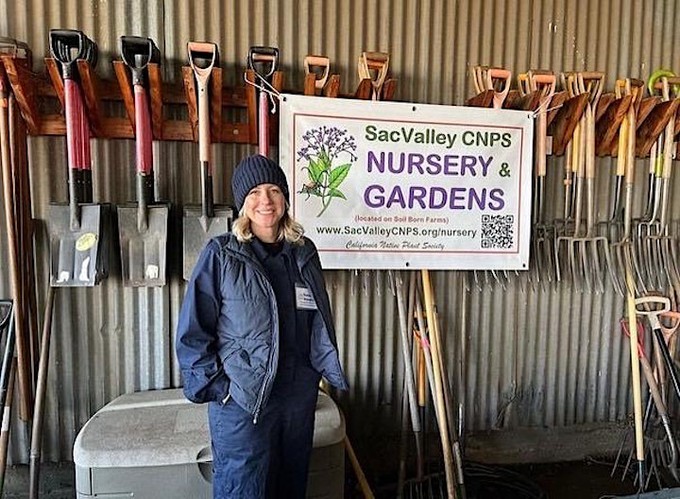
Hands-on workshop shows what to do with cuttings, divisions and seeds

Plant scientist Renee Murphy, here dressed for different weather than we currently enjoy, will lead the propagation workshop this Friday. Photo courtesy Renee Murphy
Learn how to propagate native plants during a hands-on workshop, set for 3 p.m. this Friday, Aug 18, in East Sacramento.
“Whether you dream of a flourishing garden or simply wish to expand your green thumb skills, this workshop promises to be an inspiring and informative experience for all plant enthusiasts,” say the organizers.
Plant scientist Renee Murphy, a.k.a. @midlifefarmgirl, will lead the two-hour session, billed as “Sacramento Native Plant Propagation Practice Workshop,” at McClaskey Adult Center, 5241 J St., Sacramento. Advance registration is required and space is limited. Get your ticket ($15 plus fees) via eventbrite: https://www.eventbrite.com/e/sacramento-native-plant-propagation-practice-workshop-tickets-691077420167.
“Whether you're a seasoned gardener or a complete beginner, this workshop is designed to help you gain confidence and expertise in the art of plant propagation,” Murphy said in her online class description. “During this interactive session, we will guide you through various propagation methods, providing step-by-step demonstrations and personalized assistance.”
Learn how to propagate plants via cuttings, root divisions or seeds. Also get tips on how to nurture those babies into mature plants.
“This workshop aims to foster a supportive and collaborative learning environment, allowing participants to share their experiences and learn from one another,” add the organizers.
Participants are asked to bring a pair of pruners or sharp garden scissors along with cuttings of any specific plants they’d like to practice propagating. Participants also may bring seeds to start and to share.
Comments
0 comments have been posted.Sacramento Digs Gardening to your inbox.
Sites We Like
Garden Checklist for week of April 21
This week there’s plenty to keep gardeners busy. With no rain in the immediate forecast, remember to irrigate any new transplants.
* Weed, weed, weed! Get them before they flower and go to seed.
* April is the last chance to plant citrus trees such as dwarf orange, lemon and kumquat. These trees also look good in landscaping and provide fresh fruit in winter.
* Smell orange blossoms? Feed citrus trees with a low dose of balanced fertilizer (such as 10-10-10) during bloom to help set fruit. Keep an eye out for ants.
* Apply slow-release fertilizer to the lawn.
* Thoroughly clean debris from the bottom of outdoor ponds or fountains.
* Spring brings a flush of rapid growth, and that means your garden is really hungry. Feed shrubs and trees with a slow-release fertilizer. Or mulch with a 1-inch layer of compost.
* Azaleas and camellias looking a little yellow? If leaves are turning yellow between the veins, give them a boost with chelated iron.
* Trim dead flowers but not leaves from spring-flowering bulbs such as daffodils and tulips. Those leaves gather energy to create next year's flowers. Also, give the bulbs a fertilizer boost after bloom.
* Pinch chrysanthemums back to 12 inches for fall flowers. Cut old stems to the ground.
* Mulch around plants to conserve moisture and control weeds.
* From seed, plant beans, beets, cantaloupes, carrots, corn, cucumbers, melons, radishes and squash.
* Plant onion sets.
* In the flower garden, plant seeds for asters, cosmos, celosia, marigolds, salvia, sunflowers and zinnias.
* Transplant petunias, zinnias, geraniums and other summer bloomers.
* Plant perennials and dahlia tubers for summer bloom.
* Mid to late April is about the last chance to plant summer bulbs, such as gladiolus and tuberous begonias.
* Transplant lettuce seedlings. Choose varieties that mature quickly such as loose leaf.